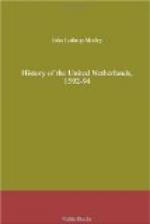It was obvious that the duke did not undervalue himself; but he had after all no intention of falling into the trap set for him. “He has made these promises (as above given) in writing,” said the Duke of Savoy’s envoy to his master, but he will never keep them. The Duchess of Mayenne could not help telling me that her husband will never consent that the Duke of Guise should have the throne.” From this resolve he had never wavered, and was not likely to do so now. Accordingly the man “of his word, of faith, and truth,” whom even the astute Farnese had at times half believed in, and who had received millions of Philip’s money, now thought it time to break with Philip. He issued a manifesto, in which he observed that the States-General of France had desired that Philip should be elected King of France, and carry out his design of a universal monarchy, as the only-means of ensuring the safety of the Catholic religion and the pacification of the world. It was feared, however, said Mayenne; that the king might come to the same misfortunes which befell his father, who, when it was supposed that he was inspired only by private ambition; and by the hope of placing a hereditary universal crown in his family, had excited the animosity of the princes of the empire. “If a mere suspicion had caused so great a misfortune in the empire,” continued the man of his word, “what will the princes of all Europe do when they find his Majesty elected king of France, and grown by increase of power so formidable to the world? Can it be doubted that they will fly to arms at once, and give all their support to the King of Navarre, heretic though he be? What motive had so many princes to traverse Philip’s designs in the Netherlands, but desire to destroy the enormous power which they feared? Therefore had the Queen, of England, although refusing the sovereignty, defended the independence of the Netherlands these fifteen years.
“However desirable,” continued Mayenne, “that this universal monarchy, for which the house of Austria has so long been working, should be established, yet the king is too prudent not to see the difficulties in his way. Although he has conquered Portugal, he is prevented by the fleets of Holland and England from taking possession of the richest of the Portuguese possessions, the islands and the Indies. He will find in France insuperable objections to his election as king, for he could in this case well reproach the Leaguers with having been changed from Frenchmen into Spaniards. He must see that his case is hopeless in France, he who for thirty years has been in vain endeavouring to re-establish his authority in the Netherlands. It would be impossible in the present position of affairs to become either the king or the protector of France. The dignity of France allows it not.”
Mayenne then insisted on the necessity of a truce with the royalists or politicians, and, assembling the estates at the Louvre on the 4th July, he read a written paper declining for the moment to hold an election for king.




